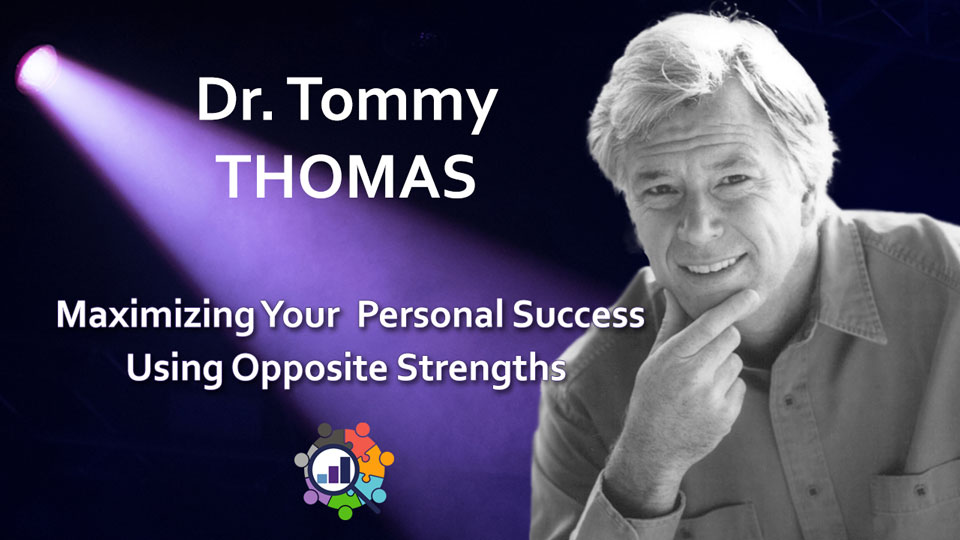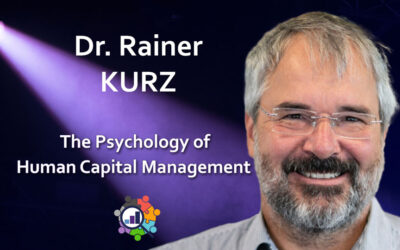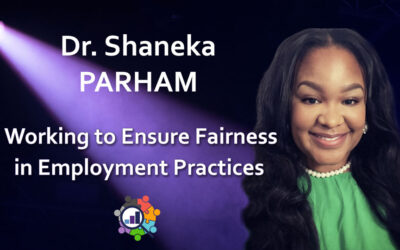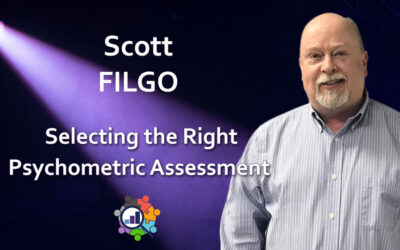Dr. Tommy Thomas – Maximizing Your Personal Success Using Opposite Strengths
A CykoMetrix Spotlight Production
Every week, the Spotlight shines on an amazing professional with a story to tell and lessons to teach. Welcome to the CykoMetrix Spotlight.
The following is an adapted transcript of the exchange between Sylvain Rochon, CMO at CykoMetrix as host, and Dr Tommy Thomas, CEO of Opposite Strengths, Inc.
Sylvain Rochon: Welcome to CykoMetrix Spotlight. My name is Sylvain Rochon. I’m the Chief Marketing Officer at CykoMetrix, a leading-edge combinatorial, psychometric, and human data analytics company that brings the employee assessment industry to the cloud with instant assessments, in-depth analysis, trait measurements, and team-based reporting features that simplify informed decision-making around recruiting, training, and managing today’s modern workplace. Today we have a bit of a treat. We have a guest whose name is extremely cool, Dr. Tommy Thomas. He is the CEO of Opposite Strengths Incorporated. Thomas is a standard bearer of the Opposite Strength system, a way of understanding people and relationships through strengths. He currently serves as CEO of Thomas Concept, the leader in healthcare culture transformation. Over the past forty years, Thomas’s concept clients have included organizations from a variety of industries.
Dr. Thomas’s publications include numerous books, seminar workbooks, training manuals, professional psychological reports, websites, computer programs, and computer algorithms. He’s currently serving as Dean of the Opposite Strengths faculty. He’s a past adjunct professor at the University of Texas at Austin. He’s a licensed psychologist in the state of Texas, and a member of the American Psychological Association, the Society of Consulting Psychologists, the Society of Industrial and Organizational Psychologists, and the Institute of Management Consultants. Dr. Thomas is a co-founder of the director of the Foundation for Research on Opposite Strengths Psychology, which funds and governs ongoing research on the opposite strength system. He also shares as host and moderator of the Opposite Strengths Annual Conference. It sounds like, doctor you are quite busy.
Dr Tommy Thomas: Yeah. I’m fairly busy most days. It’s been a long career and it’s been very satisfying.
Sylvain: Well, now thank you for joining us in the Spotlight. I’m putting you in there because we want to talk about Opposite Strengths. That is the brunt of your work or credentials surrounding that body of work over forty years. Why don’t you tell us first about Opposite Strengths? What is it?
Tommy: Opposite Strengths is a method or a conceptual system of understanding people through strengths. It was developed by my dad from his experience as one of the very first executive coaches in the country from 1955 to 1961. At that point, as he told me when I was growing up, people like him were referred to as psychological consultants to management. The term executive coach didn’t come in until probably the late 90s or early 2000s. Opposite Strengths is fundamentally based on his experience in working with hundreds and hundreds of executives back in the 50s and 60s, and then he’s taking the time two years to analyze all this experiential data and to put it into a system that purports to understand and to disseminate to other people the basic principles of what it takes to be successful.
Sylvain: Right. There’s this core assessment and body of work that has been validated, right? Also, it’s been in circulation for a certain amount of time. So, there’s also just time-based empirical validation of this whole system. Going from that foundation, how do we maximize our personal success using such a system?
Tommy: I think the first step is for you to understand yourself in terms of the strengths that everybody has. One of the foundational concepts and Opposite Strengths is that everybody is the same and that we all have the same basic six strengths that we operate from. These strengths come in three pairs of two opposite strengths. That’s one half of the paradox about us as people, which is that we’re all the same. The other half of the paradox is that we’re all unique individuals, and the way that we’re unique is how these strengths are structured within us. And that is what our assessment is designed to do. It is to indicate for you, the particular unique construction of your strengths and how you use them and the particular specific challenges that you face in becoming successful because the challenges are different for everybody. Different and unique. So until you understand that basic structure and how you operate naturally in the world, you really can’t learn why it is that there are certain things that don’t come as easily to you, certain things that do come easily to you, and how you can access all parts of yourself.
Sylvain: In your answer, you are non-specific in how this is applied. It seems like this is something for the individual, not necessarily fine-tuned, let’s say for the workplace, for example, or certain contextual situations, or environments. Is there a consideration to whatever the environment or the intent of a person getting tested for an application, like workplace versus other?
Tommy: It’s most often been used in organizations that want to maximize the success of the individual employees. Also, in more recent years, there’s been an awareness of the culture of organizations, and so it’s been used to make the culture in organizations very attractive to people and something that makes the organization a place that people want to work in and don’t want to leave. So, one of the big benefits to organizations is that it will reduce the voluntary employee turnover rate and employees quitting your organization is very expensive. It doesn’t necessarily mean that you made a bad hire in the beginning, but it may mean that you have a bad culture or you have something going on in your organization that makes these good people want to leave.
We’ve worked with a variety of organizations, and I’ll give you one example. We worked with an engineering firm. It was about a thousand employees, eight hundred and fifty engineers, and a hundred and fifty support staff. In the beginning, they told us that their two big problems were that the employees didn’t understand the vision of the organization and they didn’t communicate with each other. We analyzed those two organizational behaviors in terms of Opposite Strengths and told them exactly what we were going to do and how we were going to resolve those problems. It turns out that we discovered that engineers, by and large, over 90% of them, have a specific personality that we identified, and we were able to identify why those organizational problems occurred because of who the engineers were. It wasn’t their fault, and there wasn’t anything wrong with them, but we trained them in how to access other parts of themselves that they didn’t naturally access, and which they assumed that because everybody thought this particular way and behaved this particular way, that that was the right way to do it, and it wasn’t the right way.
Sylvain: That’s interesting how data can uncover patterns like that, and then one can apply a certain tactic or strategy to resolve an issue, in this case, engineer mentality. I’m an engineer. I understand engineers. It doesn’t matter what the specialization is, we do kind of think alike and behave in a similar way. So, there’s a pattern there. Now my follow-up question is I’ve had an interview with a person from Gallup, and they use an assessment called Clifton Strengths, which I’m sure you’re familiar with, which seems to have a similar general ideology to it. Can you compare Opposite Strengths and Clifton Strengths and how they differ, and how they are similar?
Tommy: I’m not all that familiar with Clifton Strengths, but I can tell you how Opposite Strengths is different from every other personality assessment that I’ve ever experienced. That is the fact that it’s based on a paradox about people, in fact, three paradox about people. It’s the fact that these strengths that people have come in these pairs of opposite strengths. So, it’s intuitive to people that if you want to become better in one of these strengths the other one has to come down, or it’s not tied to it. You’ve got to become just better in this one. Well, in actuality, these paradoxical paired strengths, only each one of them will become better when both of them do better. So, people that are really successful and really well developed, have a paradoxical nature to them. They are both very thoughtful and very decisive. They’re very realistic, and they’re very imaginative, and they’re very people-oriented, and yet they’re very independent and self-confident.
Sylvain: Okay. Now, that is a key difference. I didn’t know Clifton Strength until I interviewed a person from Gallup. In their cases, it’s basically a list of strengths. There are no comparisons or opposites, and just focusing on the top five or 10 strengths from the assessments, then enhancing and creating understanding in the office about such strengths, and creating conversations surrounding different methods. There are similarities because the focus is on improvement, communication and understanding of self and others. But in your case, there’s a significant difference in the thought behind the approach.
Tommy: If I remember correctly, Clifton Strengths has a list of like thirty-four or thirty-five different strengths that people choose from and they pick out their three top strengths, and then the bottom three, they pick out the three that they have to work on the most or that they want to develop. A lot of personality assessments can get very complicated, and I think complicated beyond what most people have the time to understand. Most people don’t want to become psychologists. They want to learn something that’s going to help them. Opposite Strengths is composed of six strengths, and everybody learns the same language when they come through Opposite Strengths. There’s no list that says in Clifton Strengths you could pick your three top strengths, and they could have nothing to do with the top three strengths of somebody else. So, kind of how do you do that?
Whereas in Opposite Strengths, you learn about the six strengths that you have and where you have lead and supporting strengths, and whatever that happens to be, it relates immediately to the other person you work with or your spouse or friends with. So that’s why I believe one of our main applications has become relationships, whether it’s intimate relationships or friend relationships, or work relationships. We can describe the dynamics of those relationships between any two people that take the assessment.
Sylvain: Well, that’s great. I mean, I think that’s really important. It’s part of life. Our philosophy at CykoMetrix with our own assessments is to say everybody’s complicated and everybody’s fine the way they are, also with strengths and weaknesses, right? It’s just a question of trying to improve them as a whole to become more effective in whatever they’re trying to achieve, which in our case, a focus is in the workplace and team. But in your case you help the person so the ideology is very appealing to us because even though in some situations you may see a part of you as a weakness in other situations, it can be a strength, right? It really depends on the context and how you apply your own self in situations. I think that’s brilliant. Does your approach help with bias?
Tommy: Oh, I definitely think it does. One of the things we have is a group seminars that we’ve honed over the years, and we’ve been doing it for fifty-plus years. It hadn’t been going on for fifty-plus years. I mean, it’s over each time. But we’ve been practicing this seminar. What we say at the very beginning is that the seminar is about strengths. Then one thing that we say, well, what comes to your mind when we say strengths? Most people within two or three responses will say, weakness. And we’ll say, well no, this seminar is not about weaknesses. We don’t believe you have weaknesses. You have lead strengths and supporting strengths. The weakness implies something is wrong with you, something that needs fixing, and there’s nothing about you that needs fixing. So, we prohibit people from using the word weakness in our seminars and particularly the trainers and coaches that we train to use Opposite Strengths. Weakness is not part of the vocabulary that we use.
Sylvain: Well, that’s good. I mean, there are some, let’s call them terms or dimensions in assessments in general, that for some people, when they read it, like neuroticism as a great example, they say, well, I don’t want any of that, because that sounds terrible. That sounds like I’m neurotic, which is in connotation. In normal speak, it means it’s bad, right? But in psychology, it means something kind of different. It just means you tend to be more fluid with your emotions, right?
Tommy: Correct.
Sylvain: In your training, workshops and approaches, you’re purposefully trying to use words that will be seen as positive, reinforcing, and engaging to improve. Is that correct?
Tommy: Yeah. Like, particularly, let’s say, one of the strengths. I’m thinking of a woman that went through one of my seminars about ten years ago. In our parlance, we talk about thinking being composed of practical thinking and theoretical thinking. When she completed the assessment, she said that practical thinking was her lead strength and theoretical thinking was the supporting strength, which made her more realistic and more grounded and that sort of thing. All the other people that did the assessment on her, because our assessment includes both self-reports and other reports, they all said that she led with theoretical thinking.
So, it skewed the results over to show in the final result that she lived with theoretical thinking. When she came up to me at the first break, she said, this is wrong. I lead with practical thinking, I don’t know what’s going on here. I said, well, just give it some time here. The assessment is one of the tools we used to get at who you are, just let’s just sit with it and we’ll talk about it later on in the afternoon. In the afternoon, she came up to me and she said, you know what? I grew up in a west Texas town where practical thinking was valued. I was taught that’s what I was supposed to be. I’ve been acting like that all my life, but these other people are right. I leave with theoretical thinking, and I just found myself today. To me, that’s the kind of ‘aha’ experience that I love bringing to people when they can really find out who they are and they can embrace it. Because in her culture, in her community, in her family, theoretical thinking wasn’t really valued. It didn’t bring the cows in at night, and it didn’t harvest the crops, and it didn’t do all the practical things that needed to be done. But that’s who she was and she had been hiding it all her life from herself.
Sylvain: I think that’s probably something that happens a lot to people. We are taught we should be a certain way, so we think we are because we want to be to conform. But often we’re not. And we dislike that other variation of ourselves because we’ve been told that it’s not cool, that it’s not okay.
Tommy: That’s one of the things that you learn when you become a psychometrician, is that people can approach them a certain response sets. So, one of them can be a bias toward being a certain way. So if you have only a self-report, the self-report can accurately reflect the bias that people have or the response set and not accurately reflect what their personality actually is. That’s why we’ve always included other reports from other people that know that person, because sometimes that person doesn’t know who they are, but other people do. So, they can provide a more accurate description of them. Sometimes people know who they are, and they’ve kept it from other people, and so other people can say that this person’s a certain way. Then when that person gets the results, they say, well, yeah, they see me that way because that’s what I’ve always projected to them, but I’m really this way. You learn in creating and testing and validating an assessment, how to take into account all these responses sets so that what you get is an accurate reflection of what you’re actually trying to assess.
Sylvain: Yeah. I think that’s really important. The human experience is what’s important. Right? Which brings me to my next question. The objective would be for a person and the consulting company, and also HR, whoever’s involved, if it’s workplace related, to have continuous evolution, right? Not just one workshop, for example, then when we find ourselves, but I mean, we want an improvement over time. How does your consultancy, using Opposite Strengths help a person get on that track over time and continuously become a better person to maximize their performance essentially as an individual?
Tommy: Gosh, there are several ways of doing that. One way is through actual coaching. We provide a coaching service to people on a regular basis, and it allows them to talk about the challenges that they’re facing and whatever else they want to talk about so that we can use the principles to get them to always be on the path to becoming better at what they do. Also, the principles contained in the seminar, if people just go through the seminar one time, we teach the principle of continuous growth being this process of moving back and forth from one strength to the other. So, we teach people how to self-coach, how to recognize when they’ve been on one strength too long, and they need to flex over to the opposite strength.
For some people, all they need is that one experience to learn that. Then our website has a number of different reports based on the assessment. There’s a guide to being yourself. There’s a guide to being flexible. There’s a relationship guide where you can input the information about the email address or the name of the other person, and you can get a customized guide that describes the dynamics in the relationship between you and that other person with tips on here’s what this other person wants, here are your typical challenges, and here’s what to do. You can access the website and get that information anytime you want in the future. Also, when we train enough people in an organization, and typically it’s like 13 to 20% that you reach a tipping point where everybody else sees what’s going on in that 13 to 20%, and they want to be a part of it. When they do that, the training that we do accelerates because now everybody understands why this is an important thing to have, and then it becomes a common language among the employees of the organization. So they naturally use the language and they’re naturally coaching themselves and coaching one another just through their daily interactions and what they do.
Sylvain: Essentially you’re developing habits in them to self-help and also help each other through these workshops, through knowing different tactics and engagement.
Tommy: Even if they don’t do it deliberately. I take a little tongue-in-cheek approach sometimes to people, and I’ve thought that we all have this basic structure to our personality that we can’t change. We can always make choices about how we behave, but we can’t change who we are at the core and who we are at the core will bring natural successes and it’ll bring natural challenges and what we do. So, I’ve thought about creating a program based on the twelve-step program where you show up and you say I lead from thinking, and this week I once again polarized over on thinking, and I thought way too long about this problem instead of taking action. I lead in thinking myself and it’s just a part of who I am. So, I have to become aware of when I have thought too long about things and need to move into action. If I do it enough, I can develop the habit to do that, but I will never change the fact that given a preference to action or thinking, I prefer thinking. That’s just who I am.
Sylvain: Just who you are. That’s why you’re a doctor maybe. Academics tend to be thinkers more than anything, not all of them, but a majority are thinking people. That’s true. Well, that’s great. I love the approach. I like the fact that people can get engaged, feel good about themselves. They can feel like they’re getting overall improvement as a person. Also, there’s this long tail working with you guys at Opposite Strengths where they can develop good habits on improving, right? That’s really important. You can’t just have a workshop and expect that you’re going to be a changed person for the next twenty years. Positive change is a continuous process, and you do it with little bits, and then you can develop efficiencies and improvement.
For our listeners or readers, depending on what medium you’re using to view this or to check this out, I strongly recommend that you check out Opposite Strengths and Dr. Tommy Thomas and engage. Look at what they’re doing in the assessments. Call them up and get set up. This seems like a great program. CykoMetrix approves and encourages people to engage with excellent programs like yours, Tom. You guys check it out. Thank you so much for participating in the Spotlight. It has been an amazing learning experience for me. Thank you.
Tommy: Thanks, Sylvain. I appreciate it. It’s been fun.
About Dr. Tommy Thomas – www.linkedin.com/in/drtommythomas
Tommy Thomas, PhD is the standard bearer of the Opposite Strengths system, a way of understanding people and relationships through strengths. He provides his expertise to client organizations through a variety of services. He also currently serves as CEO of Thomas Concept, the leader in healthcare culture transformation.
Dr. Thomas is currently active in executive development and culture transformation with several organizations. Over the past 40 years, Thomas Concept clients have included organizations from a variety of industries.
Dr. Thomas holds a doctorate in psychometrics and research design from The University of Texas at Austin and is a Contributing Scholar at Walden University. Dr Thomas’ publications include numerous books, seminar workbooks, training manuals, professional psychological reports, Web sites, computer programs, and computer algorithms. Visit his library for a partial listing of his works.
Dr Thomas is currently serving as Dean of the Opposite Strengths Faculty. He is past adjunct professor at The University of Texas at Austin. Dr. Thomas is a Licensed Psychologist in the state of Texas, and a member of the American Psychological Association, the Society of Consulting Psychologists, the Society of Industrial and Organizational Psychologists, and the Institute of Management Consultants. Dr Thomas is co-founder and Director of the Foundation for Research on Opposite Strengths Psychology, which funds and governs ongoing research on the Opposite Strengths system. He also serves as host and moderator of the Opposite Strengths Annual Conference.
About CykoMetrix – www.CykoMetrix.com
CykoMetrix is a leading edge combinatorial psychometric and human data analytics company that brings the employee assessment industry to the cloud, with instant assessments, in-depth analysis, trait measurements, and team-based reporting features that simplify informed decision-making around recruiting, training, and managing today’s modern workplace.



